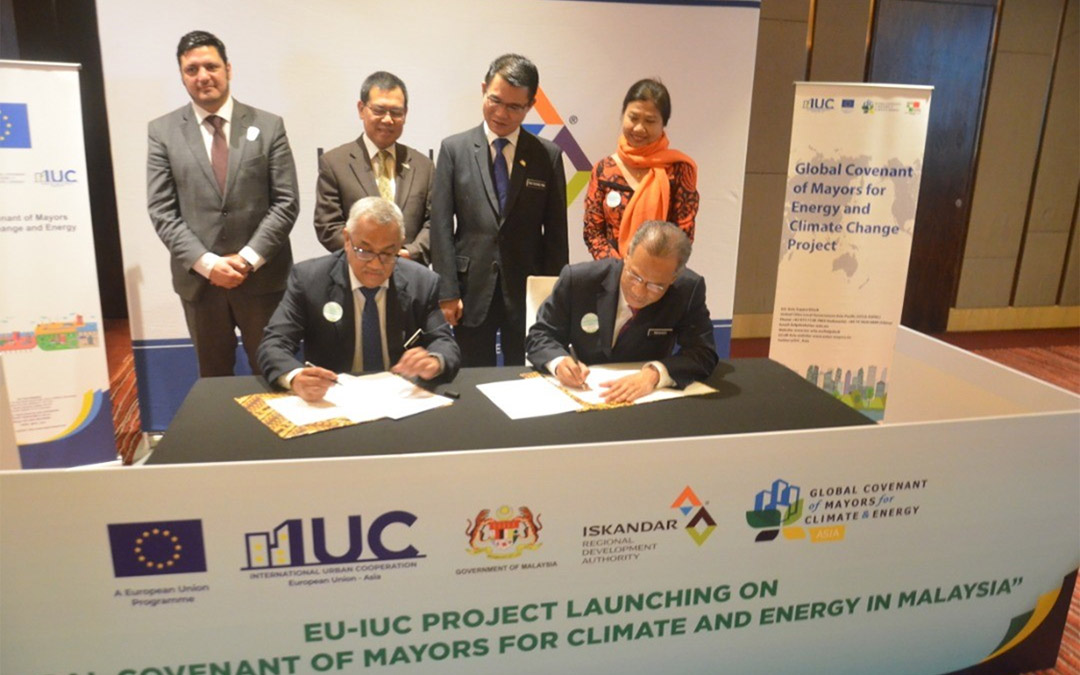The Global Covenant of Mayors for Climate and Energy (GCoM) is a global alliance of cities and local governments voluntarily committed to combat climate change and implement the Paris Agreement. Global Covenant cities take proactive actions to tackle the increasing threats of climate change and accelerate ambitious, measurable climate and energy initiatives that lead to an inclusive, low-emission, and climate resilient future.
The coalition comprises of over 9,000 thousand cities across six continents and more than 120 countries. By 2030, cities committed to the Global Covenant as of March 2018 could collectively reduce 1.3 billion tons of CO2 emissions per year from business-as-usual.
The GCoM in Southeast Asia (GCoM SEA) has been implemented by UCLG ASPAC with the support of the EU through International Urban Cooperation Asia (IUC Asia). UCLG ASPAC is hosting the Secretariat and Helpdesk of GCoM SEA, promoting the GCoM platform to cities and facilitating cities’ climate and energy ambitions through the leverage of technical and climate financing expertise and practical experiences related to climate actions, from the GCoM Network. Our latest activity took place in March with the conduct of GCoM’s national and regional level events, in Iskandar (Malaysia) and Bangkok (Thailand).
Iskandar (Malaysia)
The Climate Change Adaptation Training, supported by IUC Asia and jointly organised with Iskandar Regional Development Authority (IRDA), was part of the GCoM’s series of national level capacity building for cities in the region. Representatives from 16 cities from across the country participated in the training held from on 19 and 20 March 2019. Malaysian public practitioners at local level were trained on developing and implementing adaptation actions to climate change.
Climate change adaptation as part of climate action plan is multi-disciplinary as well as multisectoral approaches. The training drew national and international expertise from a range of subjects: Common Reporting Framework, Risk and Vulnerability Assessment, Identification of Adaptation Action, Mainstreaming of Climate Change Actions in Development Plans, Municipal Resource Management, Green Infrastructures, and Green Financing. National and international experts were also from various sectors—research, ministerial, planning, non-governmental, UN agency, multilateral, and academia.
The training entailed a series of lectures and a number of workshops on cities’ climate action status, risk and vulnerability assessment, and identification of climate change adaptation. Trainees presented their cities’ existing climate change related activities, programmes and plans. They reported results of the workshop on “Assessment of Risk, Vulnerability and Identification Adaptation Actions.” Trainees also completed reporting on Risk and Vulnerability Assessment and Adaptation sections in the Reporting Platform of either through GCoM or the Unified CDP-ICLEI.
Following the training, the GCoM initiative was launched in Malaysia, demonstrating Malaysian cities’ ambitions and commitment for cooperation to promote low-carbon, inclusive and resilient development trajectories. Through the GCoM Platform, leading figures expressed visions for transformation to low-carbon development in close partnerships with local governments, businesses, practitioners and the media. The launch also witnessed the signing of GCoM’s Letter of Commitment by City Hall of Kuala Lumpur and Perbadanan Putrajaya.
Bangkok (Thailand)
GCoM SEA held its first Regional Networking Event at the Asia-Pacific Forum on Sustainable Development on 27 March 2018. The event, undertaking the theme on “Inclusive Climate Action for Sustainable Cities,” was opened by Ambassador of the EU for Thailand, H.E. Mr Pirkka Tapiola, with welcoming remarks by UCLG ASPAC Secretary General Bernadia Tjandradewi. The panel discussion presented on-the-ground cases in the growing field of inclusive climate action by C40 Cities, Iskandar Regional Development Authority, Malaysia (IRDA), and three city cases: Banda Aceh (Indonesia), Naga City (Philippines), and Seberang Perai (Malaysia).
Cities are major contributors to climate change. Although they cover less than 2 per cent of the earth’s surface, cities consume 78 per cent of the world’s energy and produce more than 60 per cent of all GHG emissions. This also means cities are the largest market for sustainable energy and the principal arena for climate action. The goals of the Paris Agreement – to keep global warming well below two degrees Celsius – can only be reached through ambitious action at the city level. GCoM cities are leading by example, increasing ambition amongst other cities and regions.
Visit GCoM SEA Website www.asian-mayors.eu
Contact us at Helpdesk helpdesk@iuc-asia.eu
Contact us at GCoM SEA Secretariat secretariat@asian-mayors.eu











